It’s often said that creativity can’t be taught. But what if it were possible to encourage a process that allows artists to explore creative ideas that already exist deep within? A process that leads to profound insights and imagination?
That’s exactly what the Masters of Fine Arts in Screenwriting at the David Lynch Graduate School of Cinematic Arts at Maharishi University of Management® (MUM) aims to do. It teaches the nuts and bolts of screenwriting as well as the Transcendental Meditation® (TM®) technique, which helps to cultivate a student’s ability to create visionary works of art.
“If filmmaking were intellectual, you could learn to make a film from a book. There is something else going on. And that something else going on is fed by diving within,” filmmaker David Lynch, the film school’s founder, has said.
MUM’s Consciousness-BasedSM education helps students tap into an inexhaustible ocean of creativity within themselves—pure consciousness—through the practice of the TM technique. As a result, they’re more empowered as artists and better able to communicate universal truths of human life.
“I wouldn’t have pursued a screenwriting program outside of this one,” says second-year student Michael K. Jackson, who works in magazine production in Los Angeles. “It’s one thing to know how to write something. It’s another to have something to write about. This program respects creativity. It’s honored and nurtured.”
“This program respects creativity. It’s honored and nurtured.” —Michael K. Jackson, MFA student
The First and Only Consciousness-Based Screenwriting Program
“Our MFA in Screenwriting offers something no other program in the world can,” says Professor Dorothy Rompalske, the program’s creator and director, and a screenwriter herself. “Through the practice of TM, we connect consciousness with the writing process. When you do that, amazing things can happen.”
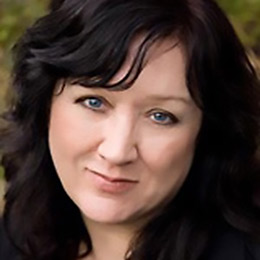
Screenwriter Dorothy Rompalske, Program Director of the David Lynch MFA in Screenwriting
Only a year old, the MFA in Screenwriting is the newest offering from the David Lynch Graduate School of Cinematic Arts, which was founded at MUM in 2013. This school is unique in combining practical knowledge with the creativity-stoking benefits of the TM technique—what Lynch has called “catching the big fish.” The filmmaker describes this process in his inspiring MUM Commencement Q&A with students.
In becoming visionary screenwriters, students don’t need to uproot their lives. The “amazing things” these aspiring writers experience take place in the context of a two-year, low-residency structure that does not require them to relocate or change their jobs or lifestyles.
Each of the four semesters begins with an immersive 10-day residency at the MUM campus in Fairfield, Iowa. Students attend lectures, panel discussions, master classes, staged readings, and workshops. They learn the TM technique in their first residency and expand their connection to their TM practice each time they return.
“This program breaks away from the competitive, monotonous, and outdated nature of many other schools, classes, and workshops,” says Craig Draheim, a student from Ann Arbor, Michigan. Faculty “are determined to bring passion and art back into screenwriting, while focusing on what makes your personal voice truly special.”
“Through the practice of TM, we connect consciousness with the writing process. When you do that, amazing things can happen.” —Dorothy Rompalske, Program Director, MFA in Screenwriting
A Personal Journey While Working with Film Industry Mentors
Back at home after each residency, students engage in distance learning under the mentorship of a dedicated film-industry professional. As students write scripts for both film and television, they dive into guided exercises, analyses of published screenplays, film screenings, and group discussions.

Writer/director Peter Farrelly (upper left) takes time out from his new film, Green Book, to discuss the project with MFA students
“The instruction is top-notch, with every instructor bringing professional credentials and experience to our classes,” says Marcia Buhler, a student from Racine, Wisconsin, who rekindled her love of screenwriting after a successful 25-year career in marketing. “The combination of intensive residencies with online classes is the perfect mix of hands-on and remote learning. I have no doubt I will be well-prepared to write professional screenplays at the conclusion of this program.”
Many students have taken several screenwriting courses before they start the MUM masters program. “It was always about, ‘Get this on this page,’ or ‘Do this,’” says Jackson, the student from Los Angeles. “It was never about, ‘Where does creativity come from? How can you nurture it?’ This MFA isn’t just about screenwriting; it’s also about inner growth. For me, it’s very much been a personal journey, which is what I was seeking.”
“This MFA isn’t just about screenwriting; it’s also about inner growth. For me, it’s very much been a personal journey, which is what I was seeking.” —Michael K. Jackson, MFA student
The Creative Oasis of Immersive Residencies, with Hollywood and TM Luminaries
When students return to Fairfield for their residencies, they benefit from being free of the distractions of home. In that oasis atmosphere, they immerse themselves both in their TM practice and their creative work. Diving deeply into the restful alertness of their TM practice, students put the resulting expansive creativity to work in writing and workshops.
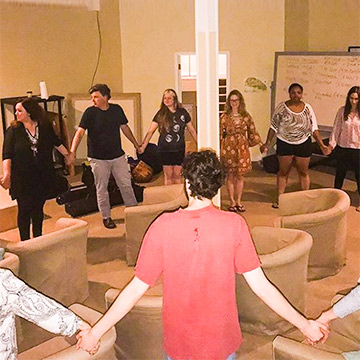
Closing night of the David Lynch MFA in Screenwriting 2017 Fall Residency, at a Sound and Vision Creativity Workshop
“I love coming to Fairfield,” says Jackson. “I think all creatives love it. There’s a vibe I’ve never felt in any other place—a warmth, an acceptance. There’s something happening below the surface. It’s very special. People are really in tune.”
Students’ work often explores transformational themes rife with personal and existential meaning, but they are free to write about any subject that holds power or interest for them.
Guest speakers are an important part of the curriculum and have included Hollywood luminaries such as Peter Farrelly, writer/director of the hits Dumb and Dumber, There’s Something About Mary, and Shallow Hal; author Dara Marks, a script doctor who’s highly in-demand; and Glenn Gers, writer of such Hollywood hits as Fracture and Mad Money, and writer/director of the independent films Disfigured and Like. Share. Follow.
Peter Farrelly talks about how the TM technique enhances his screenwriting
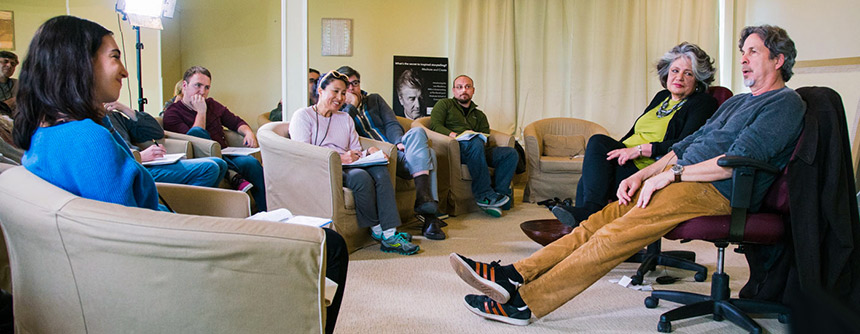
Writer/director Peter Farrelly and author and script doctor Dara Marks address MFA screenwriting students
As in all MUM programs of study, the “Science and Technology of Consciousness” is the core course for students to delve into the study of consciousness as the unifying basis of all branches of knowledge. For the MFA in Screenwriting, this course emphasizes the links between the TM technique and the creative process.
Learning the Biz from the Pros
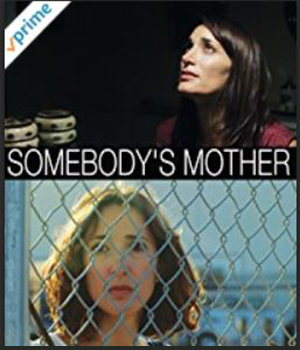
MFA Screenwriting student Gabriela Tillman’s feature film Somebody’s Mother is on Amazon Prime
During the final semester of the MFA program, students learn about the business of screenwriting—and how to market what they’ve written.
The course “Advanced Business and Marketing for the Entertainment Industry” focuses on the best industry practices for pitching, publicizing, and selling one’s film or television projects.
The program culminates in a fifth residency, this time in Los Angeles. There, students meet with industry professionals and “gain valuable insights from agents, producers, and studio executives,” says Rompalske.
“I’ve been surprised and delighted observing how my TM practice has enhanced my creative process.” —Marcia Buhler, MFA student
“Catching the Big Fish” in a Like-Minded Community
As a group, MUM’s screenwriting students find close connections with like-minded souls who seek inner development as well as creative expression.

Joanna Plafsky (third from right), co-founder of the David Lynch Graduate School of Cinematic Arts, holds a brunch for MFA students in L.A. before David Lynch’s Festival of Disruption
“Deep bonds are formed,” says Rompalske. “Our students thrive in an atmosphere of love and support they haven’t necessarily found in other programs. And through the practice of TM, they find their unique voices and grow as artists.”
Lynch has long advocated that the depth of consciousness cultivated during the TM technique—by transcending the temporal or everyday world—feeds creativity. “You can stay in the shallow water,” he is known for saying, “but if you want to catch the big fish, you’ve got to go deeper.”
MFA screenwriting students agree. “The ideas are there,” says Jackson, but “you can only access them if you’re mentally calm.”
Buhler, the student from Wisconsin, says, “I’ve been surprised and delighted observing how my TM practice has enhanced my creative process.”
Perhaps David Lynch best captured the heart of the program with the rallying cry that has become the motto of the school bearing his name: “Meditate and create!”
► The MFA in Screenwriting is accepting applications for Fall 2018. Learn more or apply.
“Our students thrive in an atmosphere of love and support they haven’t necessarily found in other programs. And through the practice of TM, they find their unique voices and grow as artists.” —Dorothy Rompalske, Program Director, MFA in Screenwriting

Warren Goldie is a freelance writer and marketing communications consultant. He works as a website writer, screenplay analyst, creative writer, and branding expert for clients in technology, education, and entertainment. He was born in Brooklyn, New York, and holds a degree in biology. Learn more about his work at WarrenGoldie.com.


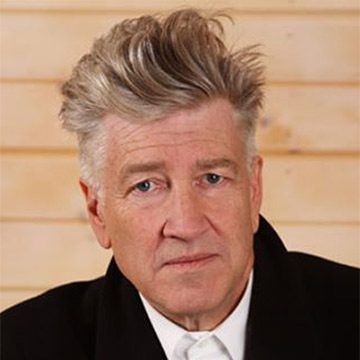
Comments
You May also like
Personal Growth
Bob Roth Interviews David Lynch on “Success Without Stress” | 49:00
TM® is "like being given a key that opens the door to that treasury (of happiness) within. Life will get better and better." —David Lynch
Warning: Attempt to read property "name" on null in /home/enjoytmnews/public_html/htdocs/wp-content/themes/transcend-site/fragments/recommended.php on line 28
Creative Success for Art Grads at Maharishi University
MUM art grads have been accepted at prestigious MFA programs around the country, where they will advance their fine art practice and careers.
Warning: Attempt to read property "name" on null in /home/enjoytmnews/public_html/htdocs/wp-content/themes/transcend-site/fragments/recommended.php on line 28
MUM Offers Online M.A. in Maharishi Vedic Science
In this 3-year program—the only one of its kind—you’ll learn about the deepest level of reality through ancient Vedic wisdom and modern science, from the comfort of your own home.
MIU.edu
What Makes MIU a Healthy University?
At Maharishi International University, we care about our students' health. That's why we serve organic, vegetarian, freshly prepared meals daily in our campus dining hall.